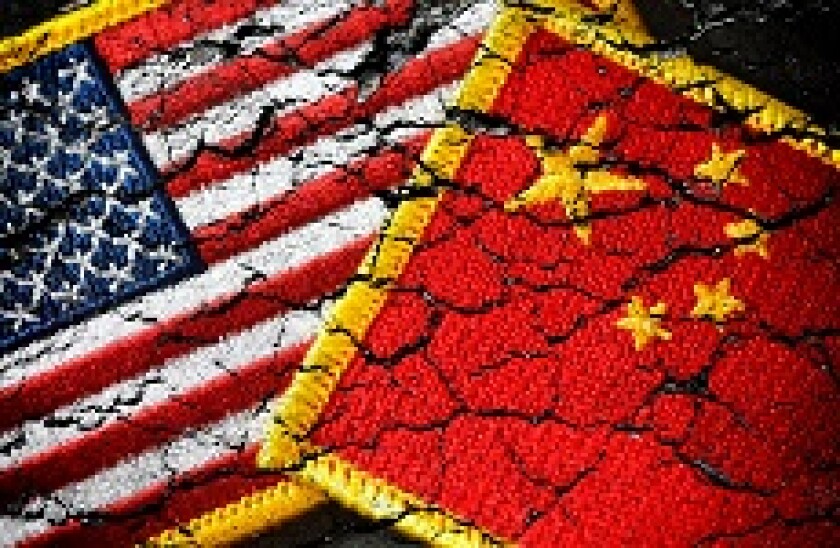Trade war drama intensified as China called US demands for the country to reduce support for its state-owned enterprises (SOEs) an “invasion” of its economic sovereignty, state-owned media Xinhua reported on Saturday.
Meanwhile, on a state visit to Japan, US president Donald Trump said the US is not ready to make a deal with China.
“I think they probably wish they made the deal that they had on the table before they tried to renegotiate it,” Trump said at a joint press conference with Japanese leader Shinzo Abe on Monday. “They would like to make a deal. We’re not ready to make a deal, and we are taking in tens of billions of dollars of tariffs and that number could go up very, very substantially, very easily.”
The trade war saga took a new twist on Tuesday. Following China president Xi Jinping’s visit to a rare earths company last week, China’s state planner the National Development and Reform Commission (NDRC) indicated in a statement that the country might use rare earth exports as leverage.
“You asked if rare earths will become China’s counter-weapon against the US’s unwarranted suppression?” the statement read. “What I can tell you is that if anyone wants to use products made from our rare earth to curb the development of China, then… the people of China would not be happy.”
China dominates the global supply of rare earths, which are used in magnets and instrument displays.
After the NDRC’s statement, the stock prices of several Chinese rare earth exporters rose. China Rare Earth Holdings was up 40%, China Northern Rare Earth Group High-Tech up 8% and China Minmetals Rare Earth up 9%.
On the same day, the US Treasury declined to label China as a currency manipulator in a statement, despite Trump’s constant claims that China has been weakening the renminbi to boost trade.
However, the report said the Treasury “continues to have significant concerns about China’s currency practices, particularly in light of the misalignment and undervaluation of the renminbi relative to the dollar. China should make a concerted effort to enhance transparency of its exchange rate and reserve management operations and goals”.
Eight other nations — Germany, Ireland, Italy, Japan, South Korea, Malaysia, Singapore and Vietnam — are on the monitoring list alongside China.
On Wednesday, Fox News host Trish Regan and CGTN’s host Liu Xin held a primetime debate on the US-China trade conflict at 8pm New York time. The show was not streamed on CGTN due to “copyright issues.”
On Thursday, China’s Ministry of Foreign Affairs spokesperson Lu Kang said that the White House had “brought huge damage to the economy of other countries and the US itself”. Lu also described US trade policy as “economic terrorism, economic hegemonism, and economic unilateralism”.
*
China's manufacturing PMI for May fell to 49.4 from 50.1 in April, according to data published by the National Bureau of Statistics on Friday morning.
The fall in the manufacturing PMI was driven by a 2.7 percentage point drop in new export orders and a 2.6 percentage point drop in import.
“The sharp deterioration of the official manufacturing PMI confirms our more cautious views that downside pressures remain strong, growth has yet to truly bottom out, the double risk is quite real and Beijing cannot afford to stop easing,” Ting Lu, chief China economist at Nomura, wrote in a Friday note.
Lu added that the employment sub-index dropped from 47.2 in April to 47.0 in May, its lowest point since March 2009, and the drop in manufacturing PMI was across different firm sizes.
Non-manufacturing PMI stood at 54.3.
*
The PBoC recently established a deposit insurance fund management subsidiary with a registered capital of Rmb100bn ($14.5bn). The institution’s aim is to protect domestic depositors’ savings at financial institutions, Caixin reported.
First set up in 2015, the fund reached Rmb100bn in 2018 but was never used, according to Caixin, citing an official at the central bank. Further, there had not been an independent manager of the fund until this week.
Huang Xiaolong, deputy head of the financial stability bureau of PBoC, now acts as the legal representative and executive director of the subsidiary.
*
Xi said on Tuesday during the 2019 China International Fair for Trade in Services that China will widen market access to foreign capital.
“China remains committed to promoting opening-up at an even higher level,” Xi said. “And the country firmly upholds the multilateral trading system.”
*
Index provider MSCI increased the inclusion factor of A-shares in its Emerging Market Index from 5% to 10% on Wednesday, as scheduled. The move incorporated 26 more Chinese stocks.
*
On Tuesday, the State Council announced 22 new rules to promote innovation in China’s 219 national economic and technological zones. These zones together make up 10% of China’s GDP, according to Xinhua.
The new measures will give these zones more autonomy over planning and seeking investments. The government also encouraged zones to utilise foreign investment and attract multinational enterprises to locate their regional headquarters, research and development centres, and finance departments in the zones.
*
Yi Gang, governor of the PBoC, told Xinhua on Thursday that by April, outstanding loans to small and micro enterprises stood at Rmb10tr, a 20% increase year on year.

